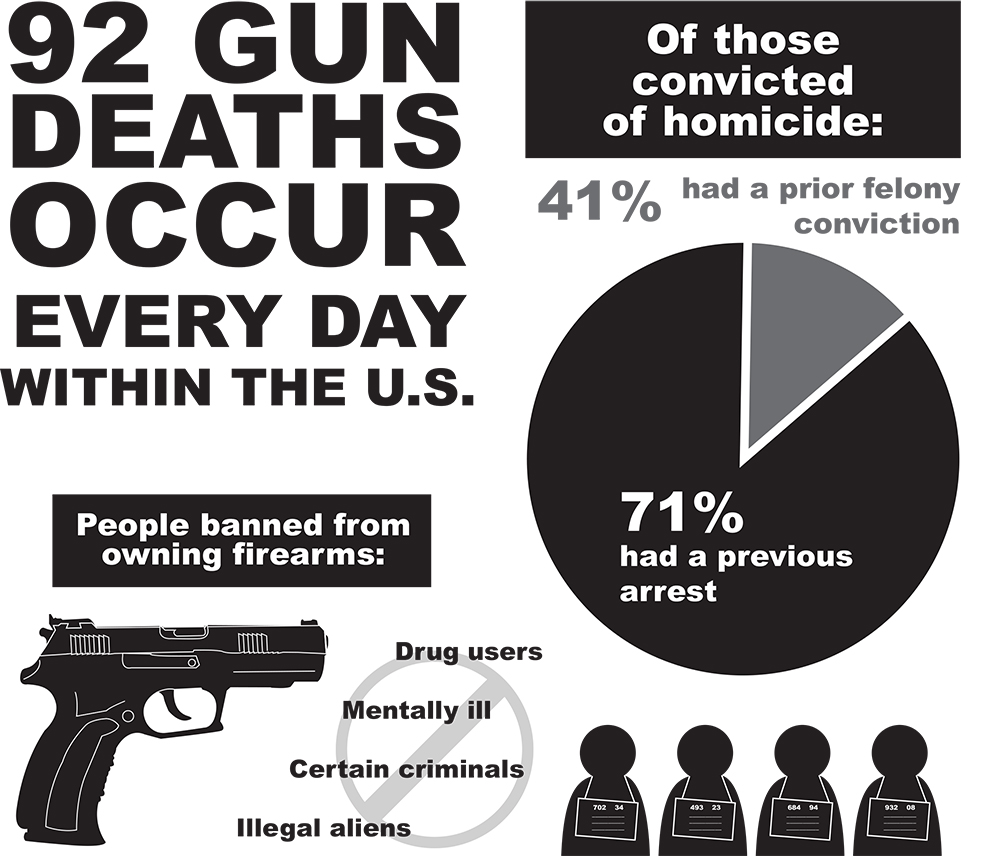On a Thursday morning on the first of October, tragedy struck Umpqua Community College in Oregon when student Christopher Harper-Mercer open fired on the campus and killed nine innocent people. In the midst of the nation’s mourning, President Obama called for the United States to move towards stricter gun laws and mirror our allies like Great Britain and Australia.
THE SECOND AMENDMENT
According to an article published in the New York Times, the United States experiences an average of 92 gun deaths every day, with fewer Americans dying in war since the American Revolution than those dying at the hands of a gun since 1970.
Yet, the second amendment in the Bill of Rights states “the right of the people to keep and bear Arms, shall not be infringed.”
From the founding of the U.S., citizens viewed guns as tools of practical defense and sport as well as symbols of American freedom.
“They see this as a defense of other rights — property rights, rights to life, liberty,” said Darren Guerra, political science professor.
For example, sophomore business major Jason Roberts and his family own guns for hunting as well as for defense.
WHAT IS THE ROLE?
According Guerra, however, the controversy lies in asking “What role do guns play in these violent acts?”
“The left tends to see the guns as the culprit, and the right tends to see individual lack of responsible responsibility individual violence or just pure evil as the culprit,” Guerra said. But both sides agree criminals and the mentally unstable should not possess firearms.
This indicates the approach we should take in preventing these gun-related violent crimes. A study in the Journal of the American Medical Association showed 71 percent of those convicted of homicide had a previous arrest with 41 percent having a prior felony conviction.
The Bureau of Alcohol, Tobacco, Firearms and Explosives indicates the Gun Control Act and the Arms Export Control Act prohibits people such as drug users, certain kinds of criminals, illegal aliens and those with mental illnesses from owning firearms. This seems fairly uncontroversial to both firearm enthusiasts and gun control advocates alike. Criminals and unstable individuals should not possess weapons.
However, news journalist Richard Perez-Pena of the New York Times notes the system has “major holes” in it. For example, incomplete criminal records hinder the government’s ability to keep guns away from convicted criminals. Although the law prohibits the mentally ill from owning a gun, this only includes those “adjudicated as a mental defective” when many people who are clearly disturbed never make it to that point.
A STRONG STEP FIRST
Still, much remains unknown about the complicated issue of gun control. A September 2013 article in The Atlantic reported on the startling lack of information on systematic reporting of individual gun incidents and injuries, gun ownership at the local level and detailed information on the operation of firearms markets.
To prevent more tragedies and protect the rights of American citizens, politicians must first fill the holes in the reasonable restrictions already in place. The U.S. should not legislate more restrictive law if it is not correctly executing the most basic and uncontroversial limitations.
To move forward, start with a strong first step. Then research more where our next step should land.







